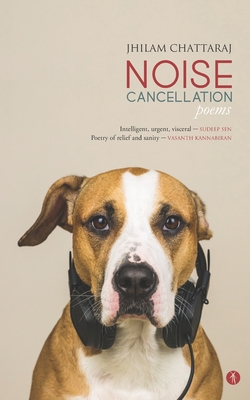Jhilam Chattaraj
Hawakal Publishers ($12.99)
by Dhishna Pannikot
Jhilam Chattaraj’s Noise Cancellation offers poems that focus on the wake of Covid-19 and our correspondingly evolving lifestyles. Chattaraj’s poems are raw and the collection is intelligent, judiciously presenting the longer segments of “Active Noise Control” before heading towards the nano-poems of life in India in “Portraits in Pods” and culminating with “Noise Cancellation.”
Chattaraj’s poems provide glimpses from various states in India, including Kolkata and Hyderabad, and extend their scope to the Andaman Islands. The poems are intricately connected through descriptive aromas that lead the reader to “imagine a mustard afternoon” or bring in “a distilled escape from the tandoors, tarkas / the measured spoons of corporate dining.” Chattaraj often contextualizes the yearning for home via home cooking, “unheard by Apps and delivery boys.” Bengali and Hyderabadi cuisine has a large impact on Chattaraj’s writing, with a careful blend of spices and flavors coming through in “Aloo Posto,” “Phuchka,” and “Ugadi Pachadi.” The “mythic joy beyond noodles, / burgers and pizza” is depicted in “Phuchka,” where the poet turns readers towards the legacy of North Indian food.
The language in Chattaraj’s poems is also a blend of English and Bengali, and one can observe words like “kodai,” “baati,” “tarkas,” and so on taking root in the minds of readers. In the exquisite poem “Ugadi Pachadi,” the poet mentions that “marriage is like a raw mango; / a surprise turn of senses,” which evokes both the sense of taste and the newness of the nuptial experience, where
We harden into pepper corns,
fingers, furious, tap the soundless
heat of agitation.
Our voice breaks into salt;
white, grainy, afraid
of losing hair, wings and words.
Chattaraj also dwells on intimate feminine experiences through poems like “Sari,” “Block Prints,” and “Self-Portrait with Thorn Necklace and Hummingbird.” In “Sari,” she deftly uses metaphor to condense the experience of being a woman when she writes, “my mother’s sari is a scripture, / a flag carrying countries of household truths” and “there’s love and violence / that only the pleats of the sari can tell.”
From these continental poems, the poet then takes a turn towards the Andaman Islands in the poems “Ross Island” and “I Will Fall Sick if You Photograph Me,” presenting untouched nature as “a triumphant answer to ‘man’s search for man.’” There is also a connection to India’s colonial past that the author often brings to her poems, exemplified by the striking line “lonely British sentries amid the rich blooms of ‘aphim’ fields” in “Aloo Posto.” Chattaraj presents the raw reality of the present as well in “What T.S. Eliot Knew about the Pandemic”: “Noise without speech; food without taste. / Bruised breaths; death has undone so many.” In another poem she continues, “in the sea of newsprint, / poets dig dirges, / and share a drink or two with sanitized words. // . . . // Poets are writing, coughing and dying. / The final orchestra plays for them too.” The pandemic also brought changes in the sphere of academia, and the monotony of online teaching is well captured when she writes, “I became the sum of pixels and spreadsheets.” The title poem brings back how this time rooted us to the basic needs of life: “Dog-like, I wait // at the door of monks / for milk and hugs. // I learn to live mild. / Sit, eat, pray // for a change.”
Through this intense collection, Jhilam Chattaraj brings to light a blend of tradition and modernity, encouraging the reader to unplug a while and bask in Noise Cancellation.
Click here to purchase this book at your local independent bookstore
Rain Taxi Online Edition Spring 2022 | © Rain Taxi, Inc. 2022


